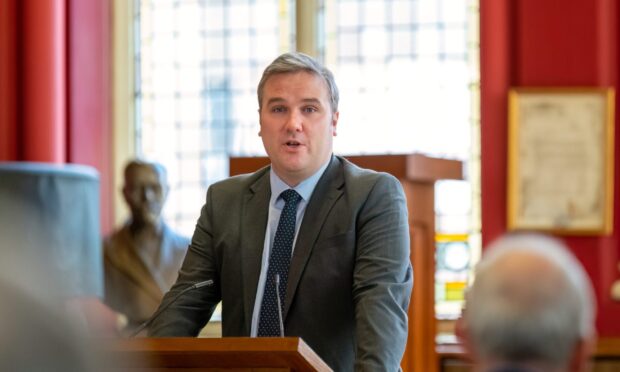
An SNP minister’s holiday hideaway has been “flipped” so that it escapes a tax on second homes that he introduced.
Tom Arthur is heaping thousands of pounds of extra charges on those with countryside retreats because he claims they are to blame for squeezing affordable housing for locals.
However, the minister for Community Wealth & Public Finance enjoys breaks at his in-laws’ second home on South Uist.
The remote cottage in the village of Stoneybridge, on the Hebridean island’s sought-after Atlantic coast, is set in eight acres of land and boasts its own private loch.
Minister’s in-laws will avoid second home tax
Now The Sunday Post can reveal that, hours after Western Isles Council voted to impose his new tax, an application was made to designate the property as a tourist let, meaning his relatives will avoid the crackdown.
Arthur’s wife, television production manager Davina, was brought up in Stoneybridge.
Her family relocated to Argyll on the mainland, but her parents, Donald and Christine MacIntyre, kept hold of their old island home.
The secluded two-bedroomed retreat in the stunning machair belt – a National Scenic Area – is surrounded by meadows and comes with an open fire, wifi and a 40-inch television.
Arthur admitted in his ministerial interests last year that “extended family members own a residential property and associated land on South Uist”.
“The property is primarily a holiday let, however, is also occasionally used as a private residence to which the minister and his wife have use.”
For many years, the MacIntyres designated their second home as a self-catering unit, which meant they were liable to pay rates rather than council tax. They were entitled to a 100% discount as a small business, though, so paid no dues.
But in 2022, the SNP introduced a licensing scheme for all holiday lets which costs hundreds, and in some cases, thousands of pounds. The deadline for existing businesses to apply for a licence was October 2023, but the MacIntyres failed to do so, meaning the property technically reverted to being a second home.
However, on February 7, Western Isles Council voted to use the powers granted them by Arthur to double council tax bills for rural retreats. From next month, his family could have been saddled with an annual bill of between £2,000 and £3,000.
No evidence home was ‘flipped’ to avoid tax
Two days later, though, the council received an application for the Stoneybridge home to be designated a short-term let.
There is no evidence to suggest they deliberately “flipped” the property in a pre-meditated attempt to avoid paying tax.
However, last December, Arthur was interrogated about the loophole by Holyrood’s Local Government, Housing and Planning Committee.
SNP MSP Willie Coffey asked: “Tom, are you concerned about any possible behavioural response to the measure in that second home owners might shift their properties into the short-term letting domain, making them liable for non-domestic rates, and thereby potentially not pay anything at all?”
Arthur – who did not declare his personal interest to the committee – replied: “We will continue to monitor that and keep it under review…[but] we propose not to make any changes at this stage.”
At an earlier meeting of the committee, local authorities called on the Scottish Government to tighten its legislation. Highland councillor Bill Lobban said: “That glitch should be removed.”
Highlands and Islands Conservative MSP Tim Eagle said: “There are serious questions for this SNP minister to answer.
“Tom Arthur should explain why he did not declare an interest in this situation when he appears to have had a clear conflict of interest involving close family members.”
Fiona Campbell, chief executive of the Association of Scotland’s Self-Caterers, said: “We have consistently warned of the unintended consequences relating to Scottish Government legislation impacting the short-term let market.”
The MacIntyres were unavailable for comment.
A Scottish Government spokesperson said: “The public list of ministers’ interests makes clear Mr Arthur’s extended family owns a residential property and associated land and that this property is primarily a holiday let. The property is already classed as self-catering holiday accommodation and is liable for non-domestic rates.”

Enjoy the convenience of having The Sunday Post delivered as a digital ePaper straight to your smartphone, tablet or computer.
Subscribe for only £5.49 a month and enjoy all the benefits of the printed paper as a digital replica.
Subscribe